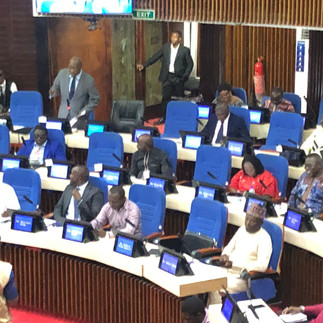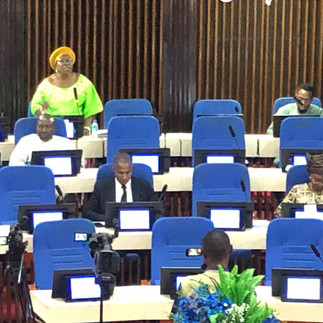
The Sixth Parliament of Sierra Leone's members unanimously agreed, following a relatively uncontroversial debate, to adjust the toll tariffs for the US$154 million, 62-kilometer dual-carriage Wellington-Massiaka Toll Road, which opened in 2016 and has a 27-year lifespan. They also recommended a comprehensive review of the entire concession agreement between the Government of Sierra Leone, represented by the Ministry of Works and Public Assets, and the China Railway Seventh Group (CRSG).
The decision comes after the tabling of the report by the Deputy Leader of Government Business One and Chairman of the Parliamentary Oversight Committee on Works and Public Assets, Honorable Bashiru Silikie.
The debate was sparked by Hon. Mohamed Bangura, and the report was ratified by the Committee of the Whole House of the Parliamentary Oversight Committee on Works and Public Assets on its inquiry into the proposed adjustment of the Wellington-Masssiaka Tollgate Tariff, presented to Parliament for approval on Thursday, April 25, 2024, during the 47th plenary session held in the Chamber of Parliament, Tower Hill, Freetown.
The Committee Chairman, Hon. Bashiru Silikie, while presenting the 29-page report, stated that the Committee began its investigation following a resolution passed by Members of the House on February 29, 2024, emphasizing the need for transparency, accountability, and consideration of citizens' interests in the adjustment process. He added that the inquiry was also prompted by a notification from the Ministry of Works and Public Assets on behalf of CRSG in light of article 10.4 of the agreement.
"The Toll Tariff shall be adjusted subject to a review on the base traffic data by both parties whenever the exchange rate varies by 10%,” as stated in Clause 10.4.
According to the committee Chair, Hon. Silikie, the approved rates will not be set at the proposed fees but an upward adjustment that allows a reprieve for all.
However, the report highlighted numerous oppositions to the tariff from activists and trade unionists, noting that during the Committee's review, the exchange rate had varied by 205%. As a result, the Government of Sierra Leone is obligated to abide by the provisions of clause 10.4.
In accordance with clause 10.4, the House approved the following adjusted tariffs: Group 1 - from Nle 1 to 3, Group 2 - from 2 to 5, Group 3 - from 4 to 10, Group 4 - from 18 to 40, Group 5 - from 183 to 250 (fuel bowsers 3-4 axles but not trailers), Group 6 - from 250 to 400 (heavy trucks 10-12 tires but not trailers), and Group 7 - a new category for heavy trucks with approximately 12 tires, trailers, semi-trailers, flat beds, and fuel bowsers with tank trailers at Nle 600.
Regarding the frequently discussed base traffic data, which the SLRA had previously informed the Committee in a public hearing held at Committee Room No. 1 that it lacked a comprehensive and timely report, the Committee acknowledged receipt of updated base traffic data from both SLRA and CRSG. The Committee further confirmed the reliability and accuracy of the traffic volume data provided by both SLRA and CSRG after a thorough review, providing a solid foundation for toll operation decisions.
However, the Acting Opposition Leader, Hon. Daniel Koroma, subtly contradicted this excerpt of the report, stating that it would have been preferable if MPs had been provided with the base traffic data in its raw form. Notably, the Committee did not specify whether the base traffic data had increased or decreased, as was the case in the exchange rate calculation under clause 10.4.
The Committee also absolved CRSG from the responsibility of constructing an alternative route, attributing the destruction of alternative routes to the diversion of heavy-duty trucks, which many believed was CRSG's responsibility. The report states: "It is imperative that the Government, through the SLRA, takes responsibility for rehabilitating and maintaining alternative routes to ensure safe and functional transportation infrastructure for citizens."
On a positive note, Committee members took a strong stance on CRSG, emphasizing that upon approval of the new tariffs, "CRSG should provide clarity on its ongoing and future Corporate Social Responsibility (CRS) initiatives," encouraging CRSG to report regularly to Parliament on the progress and outcomes of its CSR activities.
Regarding the topical concern over whether the agreement requires a review, the House concurred that "there is a need for a comprehensive review of the concession agreement."
"The Committee stresses the need for a comprehensive review of the entire concession agreement in accordance with clause 20.15 in due course. This review process, mandated every three years, is essential to identify and address potential











Comments